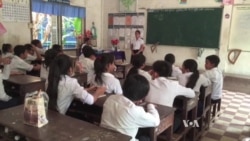U.S. first lady Michelle Obama is in Cambodia where she spoke Saturday at a Peace Corps training event in the city of Siem Reap, home to Cambodia's famed Angkor Wat temple complex. The visit is part of a two-nation trip meant to highlight a new global women's education initiative.
Obama thanked the Peace Corps volunteers for the work that they are doing to educate and empower girls in Cambodia. She called the volunteers the "living, breathing" embodiment of what her program, "Let Girls Learn," is all about.
Earlier in the day, Obama met with a group of girls at a school on the outskirts of the city.
Accompanied by Bun Rany, the wife of Cambodia's prime minister Hun Sen, Obama told the schoolgirls to stay in school and take advantage of their education to demand greater freedoms in their impoverished country.
"Let girls learn' is about giving girls like you here, all the girls who are here, giving you a voice in your communities and in your country,'' she said.
The trip is the first time that the wife of a sitting U.S. president has visited the Southeast Asian country.
During her two-day stay, Obama is also scheduled to deliver a speech to U.S. Peace Corps volunteers, and tour Angkor Wat.
Cambodia is one of 11 countries the Obama administration has targeted for its new "Let Girls Learn" initiative, which aims to help educate the 62 million girls globally who do not attend school.
Obama arrived in Cambodia after a stop in Japan.
Speaking alongside her Japanese counterpart, Akie Abe, on Thursday, Obama said the U.S. and Japan would work together on the "Let Girls Learn" initiative.
"My education was truly the starting point for every opportunity I have had in my life. But I know that for every girl like me, there are so many others across the globe who are just as smart, just as capable, just as hungry to succeed, but they have never had a chance to go to school," Obama said.
In an opinion piece this week in The Wall Street Journal, Obama said 62 million girls not in school represents a "tragic waste of human potential."
"It is also a serious public-health challenge, a drag on national economies and global prosperity, and a threat to the security of countries around the world, including our own," she said.











